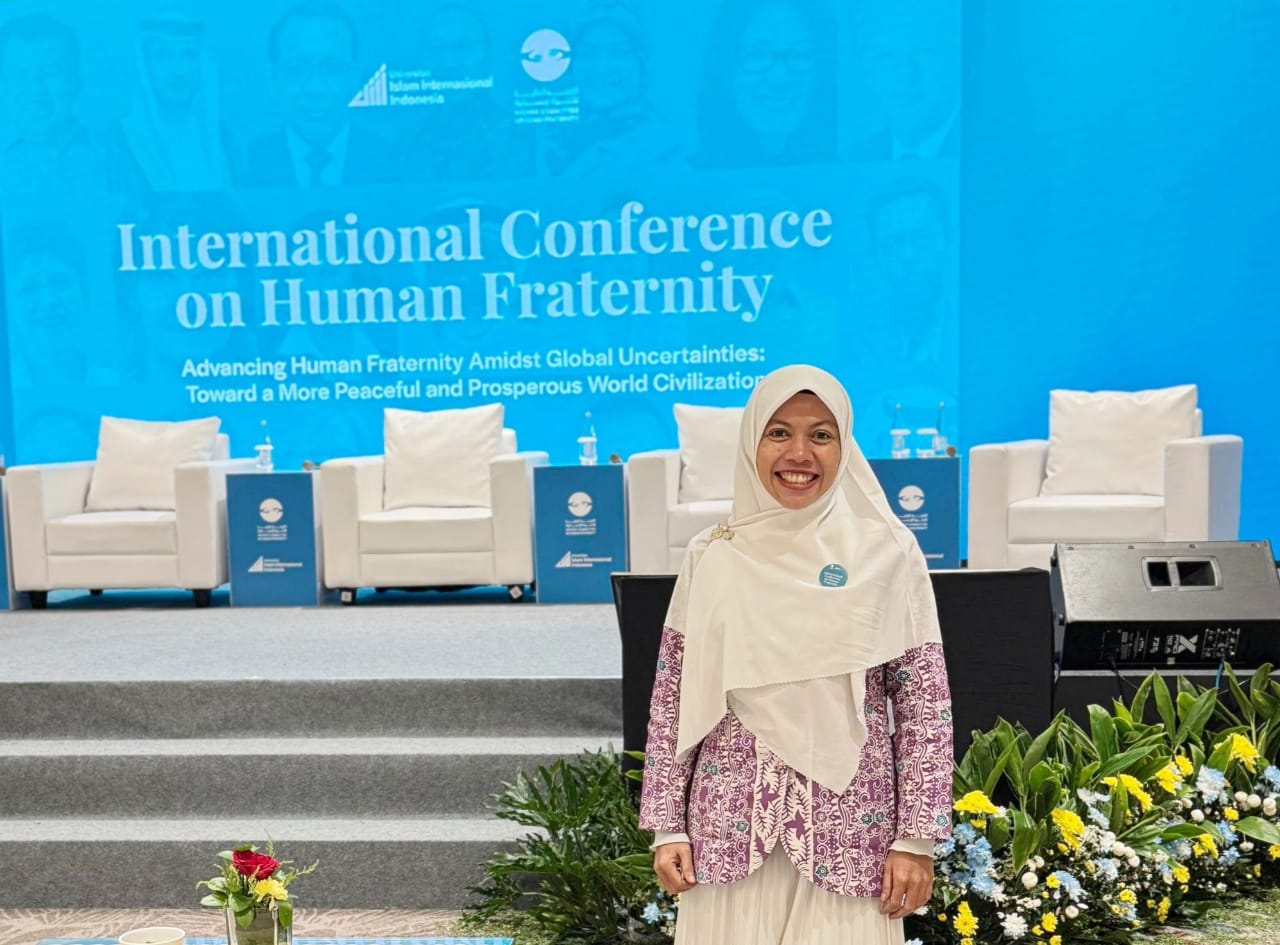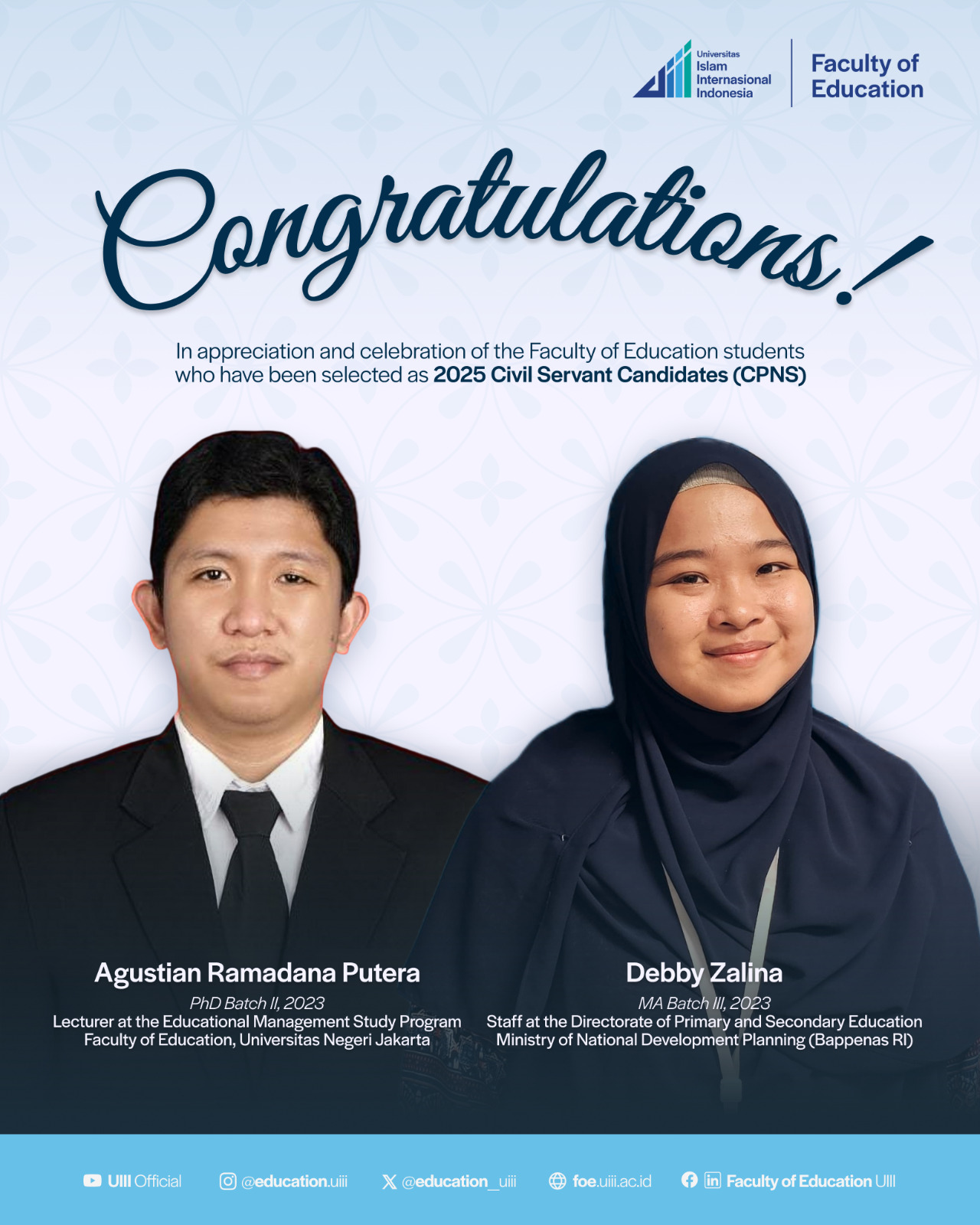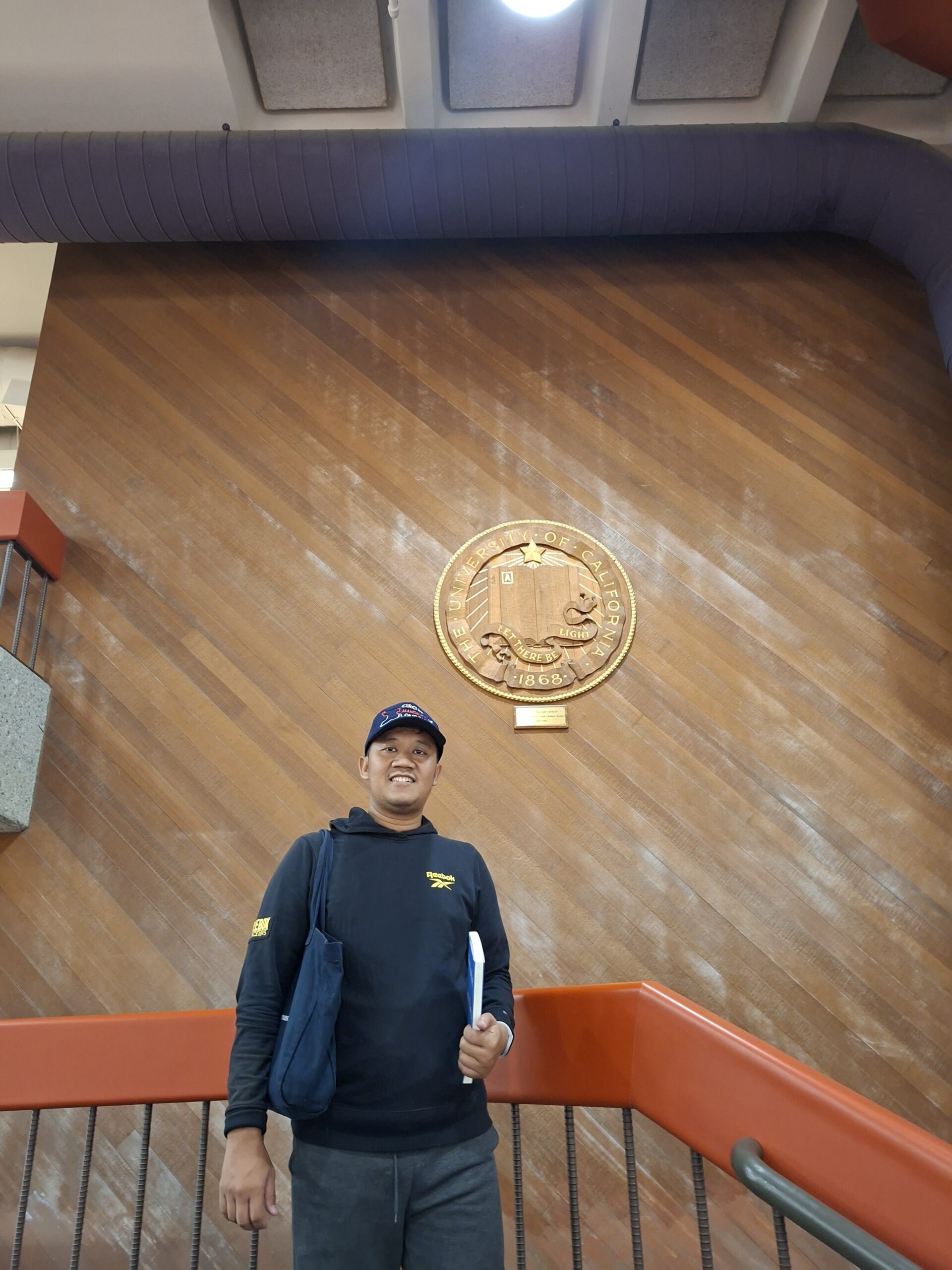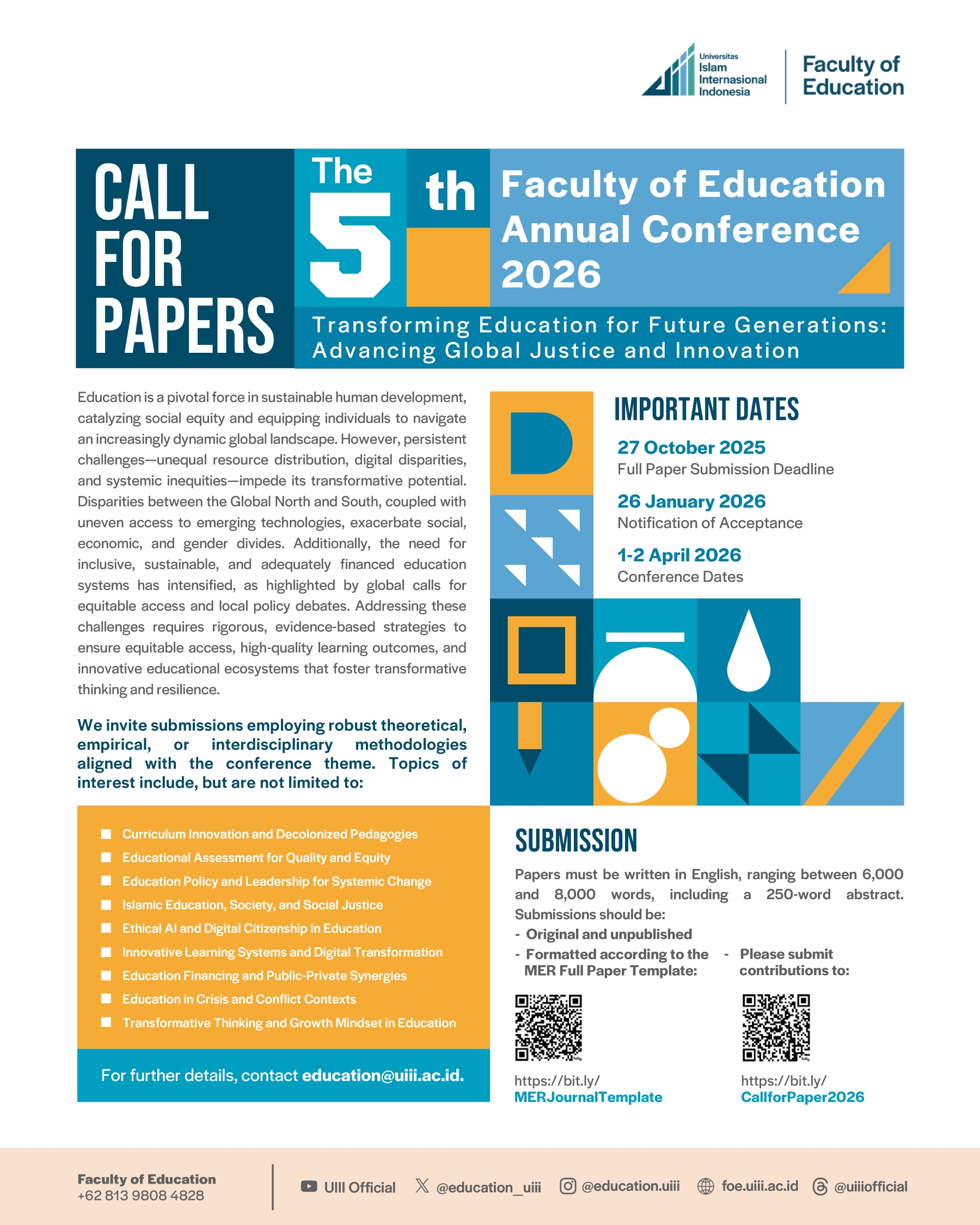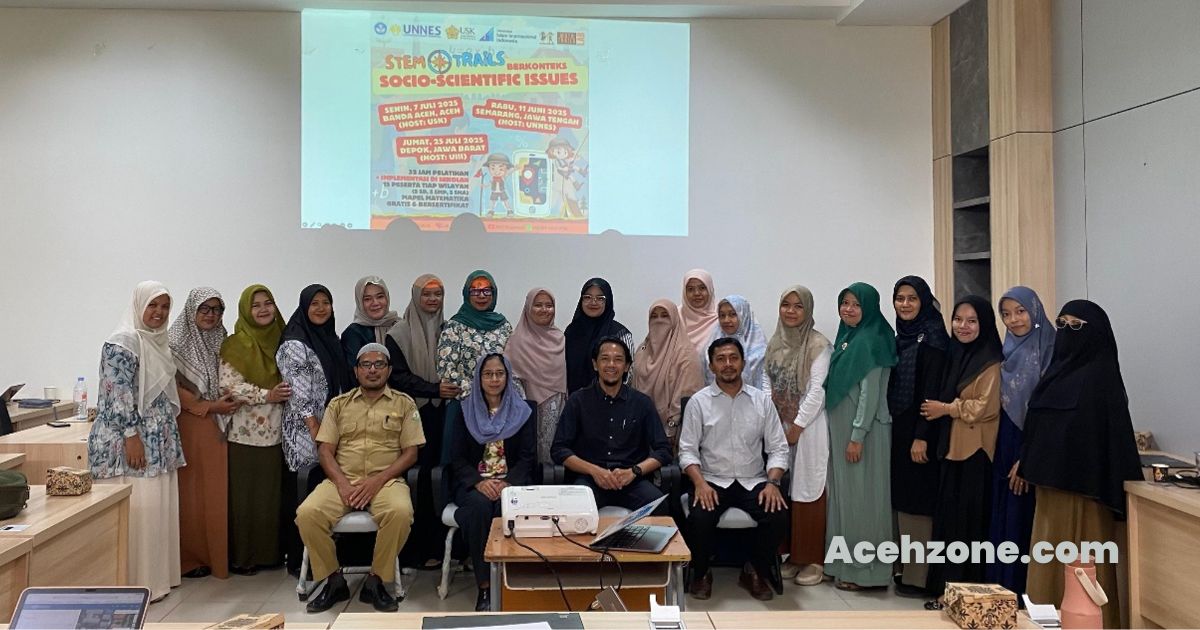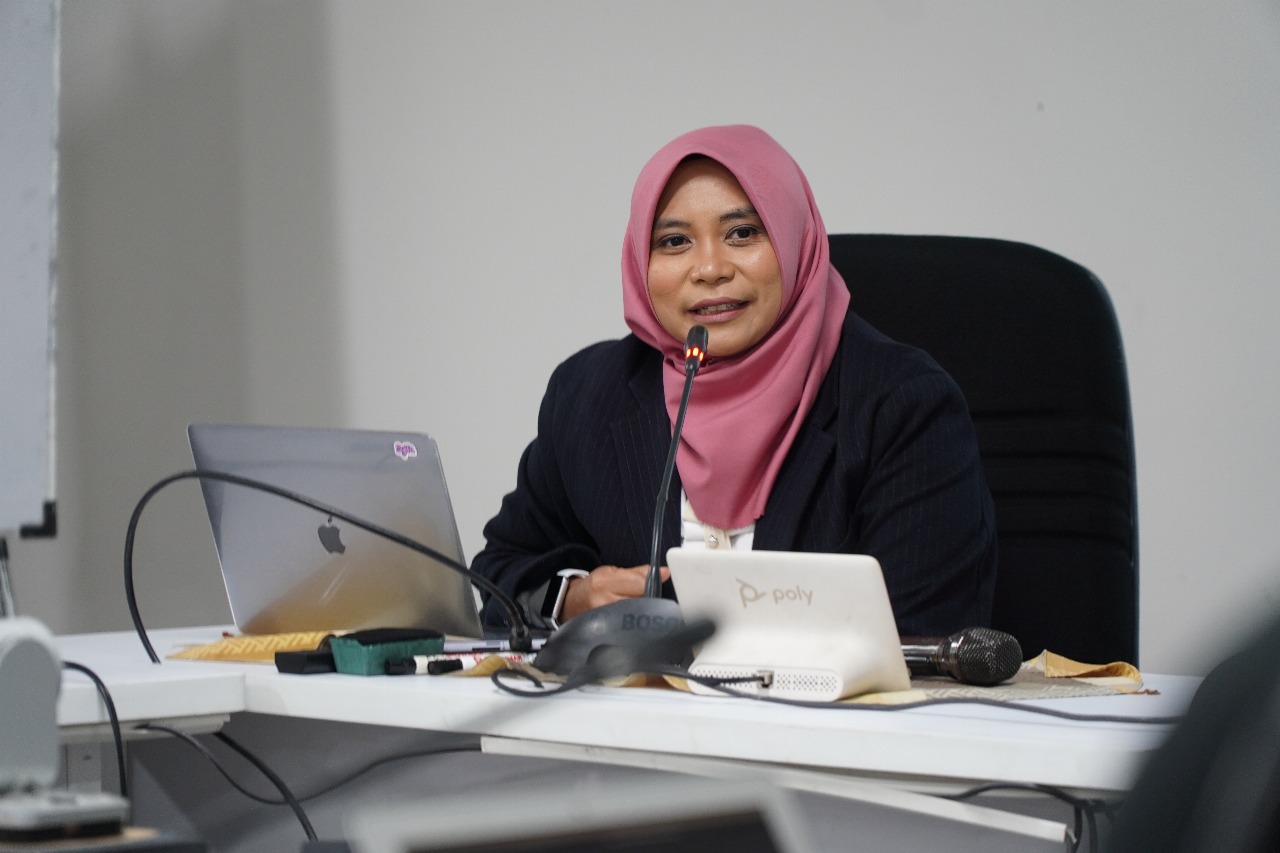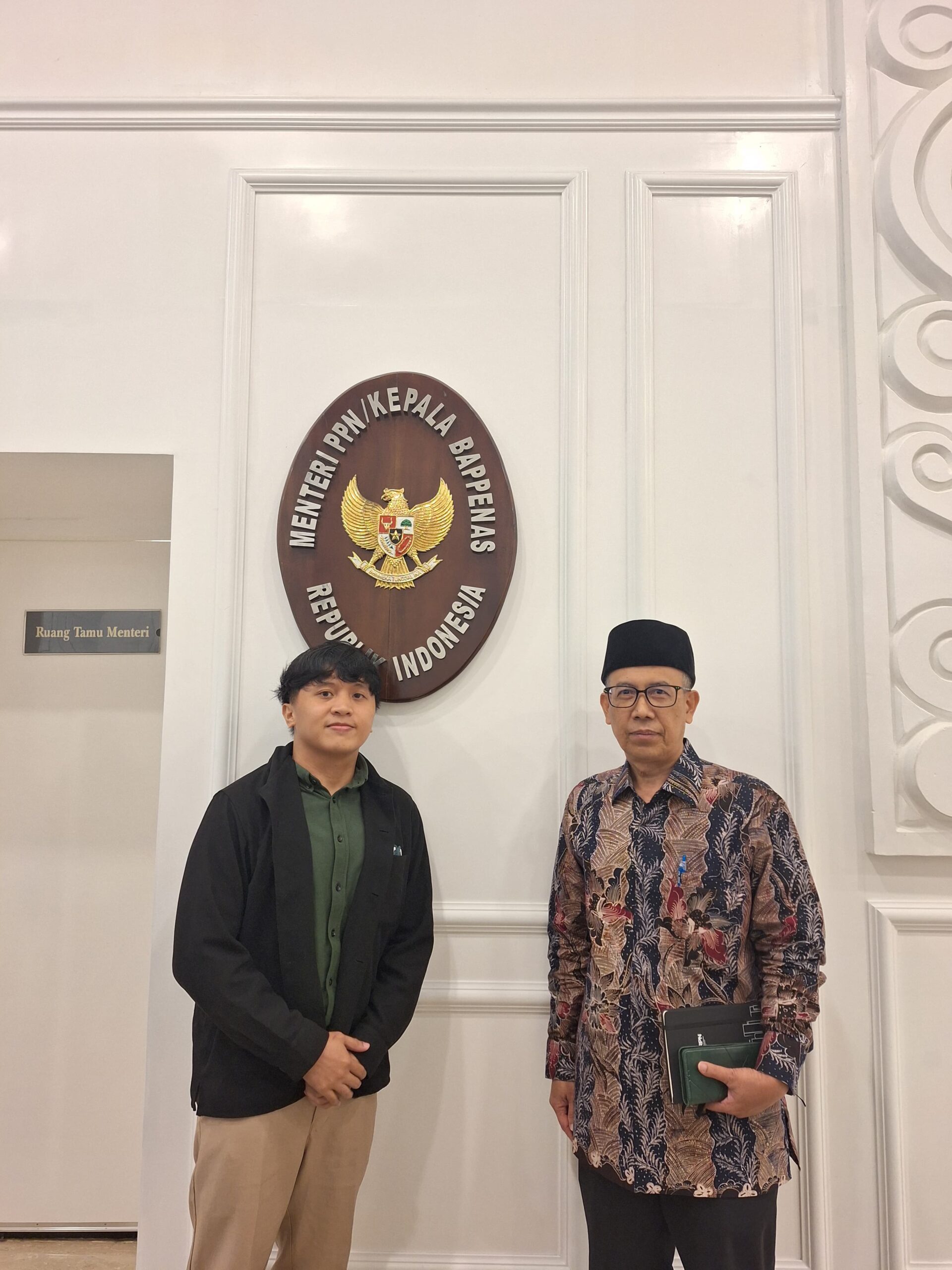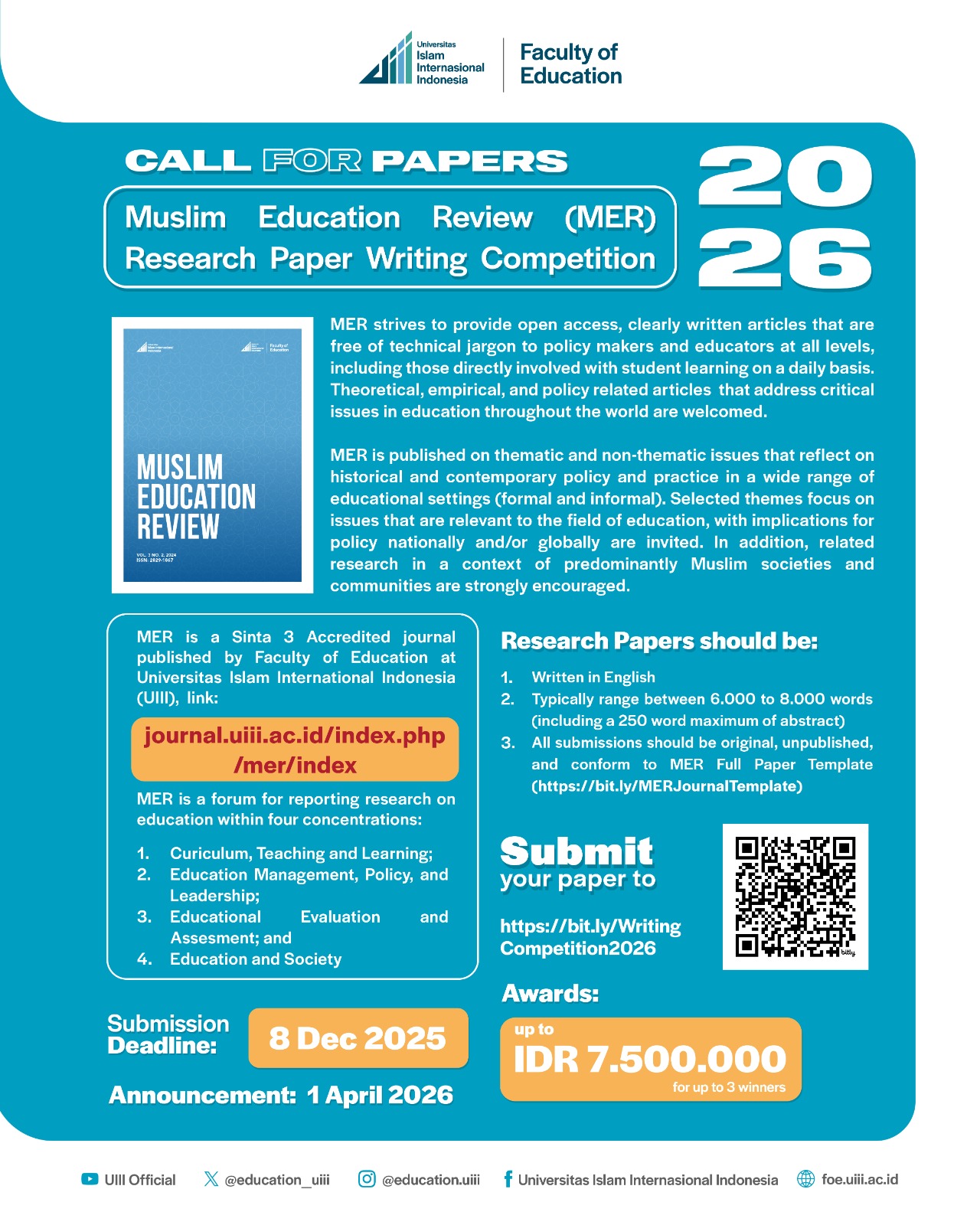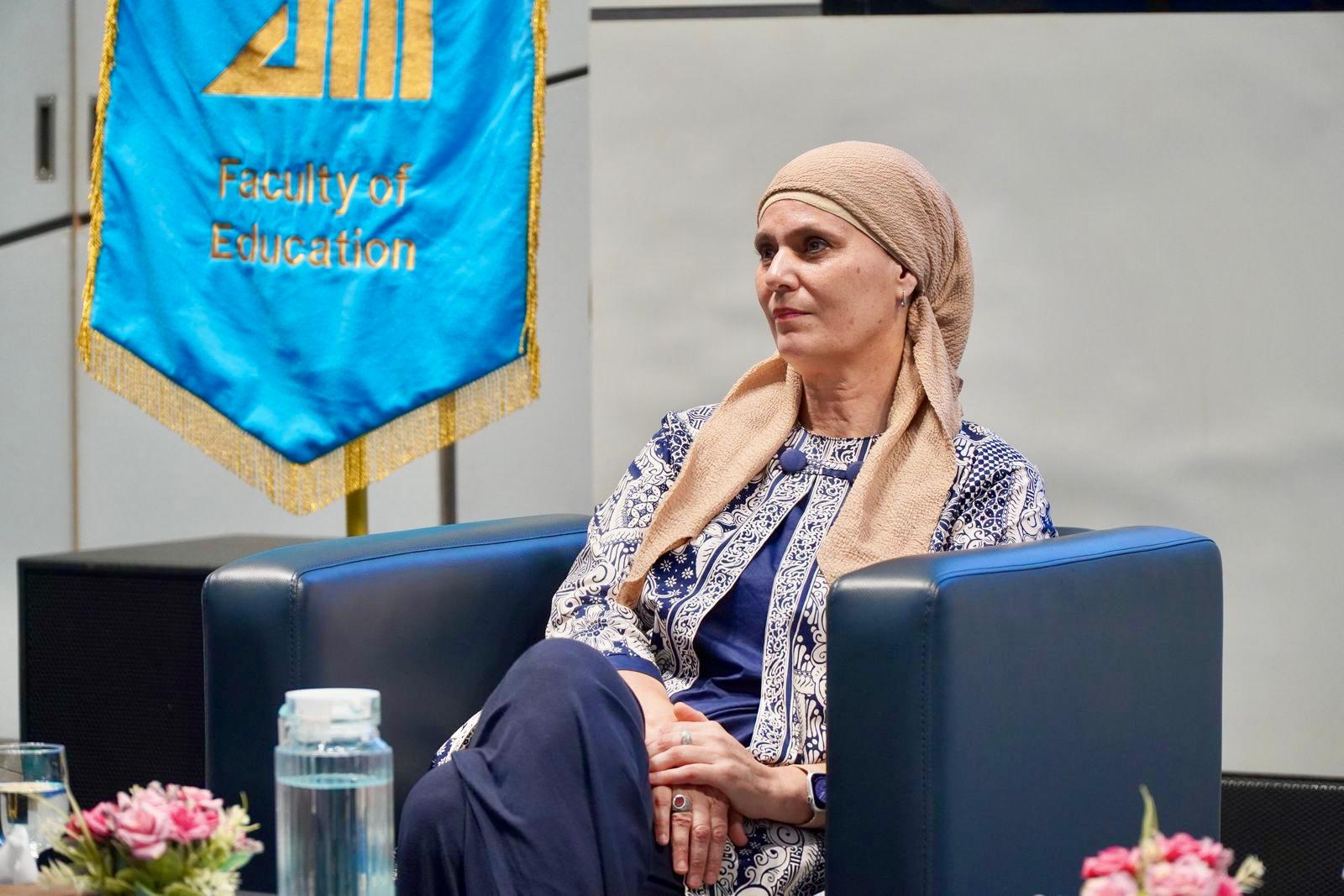Standing Side by Side: Rediscovering Humanity through the Lens of Human Fraternity

Standing Side by Side: Rediscovering Humanity through the Lens of Human Fraternity
Uswatun Hasanah
PhD Student in Education batch 3
Tuesday, 29th July 2025, marked a historic moment for Indonesia, as it witnessed the official launch of the International Institute for Human Fraternity (IIHF) through a two-day international conference themed “Advancing Human Fraternity Amidst Global Uncertainties: Toward a More Peaceful and Prosperous World Civilization.” The event was initiated by the Higher Committee of Human Fraternity (HCHF), in collaboration with Universitas Islam Internasional Indonesia (UIII). This momentum represented a concrete follow-up to the Document on Human Fraternity, signed in Abu Dhabi in 2019 by Pope Francis and Grand Imam of Al-Azhar, Sheikh Ahmed el-Tayeb. The document laid the foundation for promoting peace, mutual understanding, and coexistence across global communities.
The opening ceremony was led by three prominent figures: Prof. Jamhari, Rector of UIII; Dr. Khalid Al-Ghaith, Secretary General of the Higher Committee of Human Fraternity; and Dr. Pratikno, Coordinating Minister for Human Development and Cultural Affairs of Indonesia. Their presence highlighted the importance of this initiative in advancing global peace, interfaith dialogue, and the values of human fraternity. The establishment of the IIHF signifies Indonesia’s growing leadership in fostering inclusive cooperation and ethical responsibility at the international level.
The event continued with a series of thoughtful and emotionally resonant sessions addressing urgent humanitarian issues across the globe. Participants from diverse backgrounds (professions, religions, communities, races, and countries) immersed themselves in the event with a shared goal and a united vision: to take meaningful action in supporting displaced individuals, stateless people, and marginalized communities, so they can live their lives with dignity, recognition, and purpose.
This sense of unity became especially clear during Session 1, titled “Building Fraternity Across Borders: Migration, Poverty Alleviation, and Refugee Solidarity,” when the discussion turned to the global refugee crisis. The session seemed to bring everyone together, as if we were all in the same boat, driven by a shared desire to contribute through our own roles and efforts as a real expression of human fraternity.
This idea was reinforced by one of the speakers, Dr. Valeria Martano, Consultor of the Pontifical Council for Interreligious Dialogue, who offered a powerful reflection on the language we use when engaging with difference. She challenged the use of the word tolerance, explaining that it can imply a sense of superiority, as if one group is in the position to 'tolerate' another. Instead, she proposed the terms coexistence and mutual respect, which suggest equality and shared dignity. Her insight reminded me that true human fraternity is not about enduring each other’s presence, but about walking alongside one another with humility and genuine respect. It’s not about who gives space to whom, but how we share that space.
 During this event, I had a conversation with Simon from the Eden community, whose existence I had not been aware of before. It made me realize that just because something is unseen doesn't mean it doesn't exist. And if it does exist, whether it's a voice, a struggle, or an identity, it deserves to be recognized with equal rights, equal opportunities, and shared responsibilities.
During this event, I had a conversation with Simon from the Eden community, whose existence I had not been aware of before. It made me realize that just because something is unseen doesn't mean it doesn't exist. And if it does exist, whether it's a voice, a struggle, or an identity, it deserves to be recognized with equal rights, equal opportunities, and shared responsibilities.
In the third session on the first day, during the discussion on The Media's Role in Bridging Divides, Combating Misinformation, and Promoting Human Fraternity, Simon shared that his community often faces discrimination and even persecution as a result of misleading information circulated on social media. I felt a deep sense of empathy when he shared that reality. It made me realize that while the Human Fraternity program addresses global issues on a broad scale, its values should be applied in our immediate surroundings. This experience reminded me that we don’t always have to look far to practice human fraternity; it starts with the smallest actions and the people closest to us.
The values of accepting diversity and living side by side with others have been deeply instilled at UIII. One of the courses offered at the Faculty of Education is Education in a Pluralistic Society, taught by the Dean, Prof. Nina Nurmila. In this course, she invited guest speakers from minority groups such as the Bahá’í, Shi’a, and Ahmadi communities. Being exposed to their stories and presence made me realize something deeply significant that they are human beings, just like me. When I shook their hands, I felt their skin touching mine , and it felt no different. When they shared joyful stories, their eyes lit up, and I smiled with them. But when they shared painful memories of being discriminated against and persecuted, it tore my heart. In those moments, I stopped seeing differences in labels and started seeing shared humanity.
At the heart of this entire experience, I came to understand a deeper dimension of solidarity. It is important to hold on to our identity, our faith, our culture, our background, but sometimes, the most profound act of fraternity is being willing to set it aside, to stand side by side with those who remain unrecognized by the systems around them. Setting aside our identity, in this sense, becomes an act of compassion and solidarity. It is not a loss, but a gift, an intentional step back to allow others to step forward. As the saying goes, "Nothing can be gained without losing; even heaven demands death." If letting go of our identity allows our brothers and sisters to reclaim theirs, then the gain is far greater. And that, to me, is what human fraternity truly means.
Three Keys to Win A Travel Grant to the USA Conference
Three Keys to Win A Travel Grant to the USA Conference
By Muhammat Sabar Prihatin (Phd student at the Faculty of Education UIII 2023)
 Being accepted as a presenter in six different international conferences in Indonesia and abroad marks a significant ambition of my second-year study journey here in the faculty of education UIII. From November 2024 to June 2025, I already presented my papers in several conferences, such as the third International Conference on Religious Moderation (ICROM) held by the Ministry of Religious Affairs of Indonesia in Jakarta, 5-7 November 2024, where our lecturer Dr. Andar was one of the keynote speakers in this event. I also had a chance to present my paper online in the International Conference on Research, Community Service, and Gender Studies (ICRCSGS) conducted by UIN Imam Bonjol Padang, West Sumatera, 5-6 December 2024. Prof. Nina, our dean, was one of the keynote speakers. Not to mention, on 10-11 May 2025, I presented my paper in the third International Conference on Islamic Education and Science Development (ICONSIDE) held by UIN Mataram, Lombok, West Nusa Tenggara. The head of the PhD in Education program, Dr. Bambang, was one of the keynote speakers in this forum. Lately, I have flown all the way from Jakarta to Los Angeles to present my work in the Society for the Anthropology of Religion (SAR) Biennial Conference conducted by the American Anthropological Association, taking place in the University of California, Santa Barbara (UCSB), California, USA, 21-23 June 2025.
Being accepted as a presenter in six different international conferences in Indonesia and abroad marks a significant ambition of my second-year study journey here in the faculty of education UIII. From November 2024 to June 2025, I already presented my papers in several conferences, such as the third International Conference on Religious Moderation (ICROM) held by the Ministry of Religious Affairs of Indonesia in Jakarta, 5-7 November 2024, where our lecturer Dr. Andar was one of the keynote speakers in this event. I also had a chance to present my paper online in the International Conference on Research, Community Service, and Gender Studies (ICRCSGS) conducted by UIN Imam Bonjol Padang, West Sumatera, 5-6 December 2024. Prof. Nina, our dean, was one of the keynote speakers. Not to mention, on 10-11 May 2025, I presented my paper in the third International Conference on Islamic Education and Science Development (ICONSIDE) held by UIN Mataram, Lombok, West Nusa Tenggara. The head of the PhD in Education program, Dr. Bambang, was one of the keynote speakers in this forum. Lately, I have flown all the way from Jakarta to Los Angeles to present my work in the Society for the Anthropology of Religion (SAR) Biennial Conference conducted by the American Anthropological Association, taking place in the University of California, Santa Barbara (UCSB), California, USA, 21-23 June 2025.
Those experiences reflect my endeavours to engage in national and global academic conversations as an emerging scholar. This story would have never happened unless because of various valuable lessons I learned, particularly from our beloved university. I figured out three keys that I believe had enabled me successfully to participate in such meaningful academic events I mentioned before, including winning a competitive travel grant for the U.S. conference. Let me share my reflection on this story in more detail, as follows.
Themed Religiosities, Ecologies, and Environmentalisms in the Age of the Anthropocene, the SAR conference was attended by hundreds of presenters, such as university students, lecturers, and professional researchers, coming from world top institutions and universities, such as Harvard, Stanford, Oxford, Michigan, Toronto, Cambridge, Edinburg, SOAS, Melbourne, Sydney, Beijing, Taiwan, and many more. In that conference, I was the one and only presenter coming from Indonesian university, which is our beloved UIII. I shared my comparative findings about the roles of two prominent Indonesian Islamic mass organizations, NU and Muhammadiyah, in their stewardship towards environmental obstacles in Indonesia based on Wasatiyah principles. Actually, there was another Indonesian presenter, my colleague who is currently a PhD student in the faculty of Humanities and Social Sciences at UCSB. He is the one who shared the information about this conference with me. Thanks to a friendship that turned into networking.
Thank God, in addition to being accepted as presenter, I also won a travel grant that is awarded to only five grantees in the SAR conference. I was so happy to be one of them. To apply for this grant, we are required to submit an accepted abstract, statement letter explaining why we fit the requirements, and latest CV. This grant was very beneficial to facilitate my U.S. Visa application as well as to financially support my departure to the USA.
The SAR conference, for me, is one of the most prestigious and essential academic forums I have ever joined. It presented expert scholars who shared their academic works that positively have direct impacts on wider society, including in the environment where the study was conducted. Additionally, their findings offer adaptable policies and recommend concrete actions that can be adopted by governments and the stakeholders, leveraging benefits of the research itself. Overall, their presentation really amazed me in the sense of the way they did their study, and this is what I mean by essential, that academic conferences become an inspiring platform to exchange knowledge and shape understanding through thoughtful and meaningful research for the goods of human beings as well as the environment.
Should I leave a message to encourage colleagues, as emerging scholars, to take part in such academic forums, I have three things to say. First I would say public events matter. Let us join in public lectures, such as seminars, conferences, book discussions, etc., that we think can enrich our knowledge and broaden perspectives even if the topic falls apart from the field of our study. Such programs often help unexpectedly connect our study field with other branches of disciplines. This combined-areas meeting can be crucial to discover distinct sights in conducting research as well as a key factor for collaborative study. The SAR conference topic is actually not really my study area since it is more on religion, society, and environment, while my major is education. However, I remember the fifth ClimateTalk on Muslims Environmentalism held by FOSS and a public lecture on Faith & Environment: Pragmaticism, Piety, and Ethics held by our university inspired me to write the paper.
Secondly I suggest that anything can be studied scientifically. Let us take benefits from classes, courses, or programs, such as writing clinics in our library, that offer us opportunities to learn research methodology, whether qualitative, quantitative, or mixed-methods. For me, research skills, such as collecting and analysing data, constructing conclusions or reflections, and knowing proper tools are keys that enable us to conduct a scientific study properly. Surely it is great if we can apply more than one method in doing research. But, truly mastering one approach only is already sufficient to study any human activities, events, or phenomena academically. So, instead of doing complex research such as field work for my paper in the SAR conference, I chose the most doable method for me by doing a comparative content-analysis study. I can do this because I have learned several research methodology courses previously.
Last but not least, thanks to the existing various communities in our university. I believe such Islamic Global Challenges (IGC) initiative under the faculty of Islamic Studies in our university is crucial for all civitas academia, including students and lecturers from any department. Such programs can serve as a platform for collaboration and contribution to increase our concerns toward global issues through research or real actions. Thus, our university should optimize their roles/functions so that the beneficiaries will also get more maximum. I strongly believe that the potential of IGC I mentioned in the SAR Travel Grant proposal form at that time became one of the most powerful reasons why I won the award.
Call for Papers: The 5th Faculty of Education Annual Conference 2026
 Call for Papers: The 5th Faculty of Education Annual Conference 2026
Call for Papers: The 5th Faculty of Education Annual Conference 2026
Transforming Education for Future Generations: Advancing Global Justice and Innovation
Education is a pivotal force in sustainable human development, catalyzing social equity and equipping individuals to navigate an increasingly dynamic global landscape. However, persistent challenges—unequal resource distribution, digital disparities, and systemic inequities—impede its transformative potential. Disparities between the Global North and South, coupled with uneven access to emerging technologies, exacerbate social, economic, and gender divides. Additionally, the need for inclusive, sustainable, and adequately financed education systems has intensified, as highlighted by global calls for equitable access and local policy debates. Addressing these challenges requires rigorous, evidence-based strategies to ensure equitable access, high-quality learning outcomes, and innovative educational ecosystems that foster transformative thinking and resilience.
The Faculty of Education at Universitas Islam Internasional Indonesia (UIII) invites scholars, policymakers, educators, and researchers to submit abstracts and papers for the 5th Annual Conference, to be held in 2026, under the theme "Transforming Education for Future Generations: Advancing Global Justice and Innovation." This two-day hybrid conference will serve as a global platform for interdisciplinary dialogue, empirical research, and policy-relevant solutions, drawing on UIII’s Faculty of Education concentrations: Curriculum, Teaching, and Learning; Educational Assessment and Evaluation; Education Policy, Management, and Leadership; and Education and Society. The conference aims to address pressing challenges in global education, from ethical AI integration to fostering growth mindsets and equitable financing.
We invite submissions employing robust theoretical, empirical, or interdisciplinary methodologies aligned with the conference theme. Topics of interest include, but are not limited to:
- Curriculum Innovation and Decolonized Pedagogies: Designing inclusive curricula and teaching practices that integrate diverse cultural, historical, and Islamic perspectives to foster equitable, innovative, and deep learning environments.
- Educational Assessment for Quality and Equity: Advancing evidence-based assessment and evaluation methodologies to ensure high-quality, inclusive learning outcomes, particularly for diverse and marginalized groups.
- Education Policy and Leadership for Systemic Change: Formulating policies and leadership strategies to promote global partnerships, sustainable financing, and resilient education systems, linked to the Education Policy, Management, and Leadership concentration.
- Islamic Education, Society, and Social Justice: Investigating education’s role in promoting social cohesion, civic engagement, and equitable access for girls, boys, and disadvantaged groups, especially in conflict-affected regions.
- Ethical AI and Digital Citizenship in Education: Leveraging artificial intelligence and digital technologies to enhance learning while addressing ethical challenges, algorithmic biases, and access disparities.
- Innovative Learning Systems and Digital Transformation: Developing hybrid, lifelong, and technology-enabled learning ecosystems to shift paradigms from traditional schooling to flexible, inclusive learning.
- Education Financing and Public-Private Synergies: Creating sustainable funding models through public-private partnerships to support free education mandates and strengthen school ecosystems, particularly in underserved areas.
- Education in Crisis and Conflict Contexts: Ensuring children’s right to education in times of conflict and displacement through resilient school ecosystems and global partnerships.
- Transformative Thinking and Growth Mindset in Education: Fostering resilience, adaptability, and innovative thinking in learners and educators through evidence-based pedagogical and policy interventions to promote lifelong learning and equitable educational outcomes.
Submission Guidelines
Papers must be written in English, ranging between 6,000 and 8,000 words, including a 250-word abstract. Submissions should be:
- Original and unpublished
- Formatted according to the MER Full Paper Template:
https://bit.ly/MERJournalTemplate
Please submit contributions to: https://bit.ly/CallforPaper2026
Important Dates
- Full Paper Submission Deadline: 27 October 2025
- Notification of Acceptance: 26 January 2026
- Conference Dates: 1-2 April 2026
This conference is free of charge. However, participants are expected to cover their own travel and accommodation expenses. For affordable on-campus accommodation, please contact: +62 812-8000-6307 (Direktorat Pengembangan Usaha UIII)
Collaboration of Three Campuses Brings Forth STEM Trails in Aceh
 Collaboration of Three Campuses Brings Forth STEM Trails in Aceh
Collaboration of Three Campuses Brings Forth STEM Trails in Aceh
Banda Aceh (7/7/2025)—An innovative educational training program under the name STEM Trails with Socio-Scientific Issues was successfully held in Banda Aceh on Monday, July 7, 2025. This event was born from a collaboration between Universitas Syiah Kuala (USK), Universitas Negeri Semarang (UNNES), Universitas Islam Internasional Indonesia (UIII), and Math Trails Lab as part of the Indonesian Collaborative Research (Riset Kolaborasi Indonesia) program.
This training program, attended by elementary, middle, and high school teachers from various regions of Aceh, aims to provide educators with in-depth STEM teaching skills. Participants were supplied with 32 hours’ worth of materials, discussions, and hands-on implementation in their respective schools—all free of charge.
Three speakers were invited to facilitate this training session: Prof. Mailizar (USK) on STEM Learning, Dr. Adi Nur Cahyono (UNNES) on the concept of Math Trails, and Dr. Destina Wahyu Winarti (UIII) on integrating socio-scientific issues into learning.
Participants weren’t just passive recipients in this training, as they were also assigned to create and implement Math Trails in schools, which would then be documented into MathCityMap, a GPS-based educational application. Through this approach, mathematics is no longer a mere number-centered concept, but also a relevant, real-world experience.
This event is an endeavor to strengthen national-level synergy in developing a relevant and engaging educational framework that encourages critical thinking through deep learning. Banda Aceh serves as the first point in a series of national trainings, which will be continued in Semarang and Depok on later dates.
Organizing parties hope that this event can become a catalyst for educational transformation in Aceh as well as Indonesia. This cross-sector collaboration is expected to continue through mentoring, further research, and development of STEM-based learning models that can adapt to the ebbs and flows of time.
Empathy and Well-being: Values That Inspired Me as a Student Mom
 Empathy and Well-being: Values That Inspired Me as a Student Mom
Empathy and Well-being: Values That Inspired Me as a Student Mom
By Syifa Mufiedatussalam
Pursuing my Ph.D. at the Faculty of Education, I began my journey as a “healing” of my daily routine as an 8 to 5 worker. At that time, I thought this was my opportunity to gather with new friends from various countries, expand my knowledge, and of course, earn another degree.
This journey, however, was not without its challenges.
I never thought that the journey would be like a rollercoaster. My life, which was far from academic activities, turned into a life full of papers, reading, and writing. Moreover, I experienced my first semester during the pregnancy, together with overwhelming academic activities. Then I gave birth and raised a baby, who is now entering toddlerhood. I experienced all of this alongside my commitments as a PhD student and a working mom.
Through the initiation of the Faculty of Education, under the Dean Prof. Nina Nurmila, Ph.D, the university established a daycare. At that time, it was exactly 3 weeks after I delivered my baby. I felt how the faculty, in their very empathetic way, tried to fully support us. The faculty gently encouraged me to focus on my study, reassuring me that my child was in good hands. However, it doesn't mean that my journey then became smooth without obstacles. I experienced baby blues syndrome because my child was hospitalized almost every two months at that time. Meanwhile, at the same time, I had to submit my course papers and presentations. Moreover, I am aware of the limitations of my academic writing skills where I have to learn from scratch to catch up with my Ph.D. fellows. Nevertheless, I am very fortunate that until now, daycare has become a very important support system for me.
Beyond facilities, what truly makes me survives was the community. Alhamdulillah, I was blessed with a new family here. The faculty members were always ready to share their knowledge generously. When I knocked on their doors with questions, I was welcomed with patience and thoughtful responses. Their sincerity made learning feel like a shared journey. At the beginning of my Ph.D., I was particularly concerned about how the dissertation phase would unfold. I was worried that, as we each progressed into our individual research projects, we would become isolated—detached from our peers and overwhelmed by the demands of our dissertations. However, as the journey progressed, I realized that I was not alone. My supervisors accompanied me patiently through every stage of the research process, providing not only academic guidance but also emotional encouragement. I was also surrounded by fellow Ph.D. students from Batch I—people who became more than peers. We shared struggles, victories, and quiet encouragements. We lifted each other up, laughed through stress, and held on to hope together. That sense of brotherhood and sisterhood was priceless.
More importantly, the faculty demonstrated a deep awareness of this concern by establishing a structured system of bi-monthly Dissertation Progress Meetings. These meetings served as a vital space to monitor progress, however small, and to maintain a sense of momentum. They were not merely administrative check-ins; they became opportunities to receive constructive feedback, strategic recommendations, and positive reinforcement to help us overcome research challenges. These meetings gradually turned into our “Ph.D. Batch I family gatherings”—a moment of truth where we shared stories, laughter, struggles, and strengthened the bonds of friendship. In those spaces, we reminded one another that we were never alone on this journey. What changed the most was me.
In the course on education and pluralistic society, A/Prof. Charyna Ayu Rizkyanti, Ph.D introduced us to empathy. I never expected that we would learn about empathy in the Faculty of Education. However, since that moment, I started to fall in love with empathy. I reflected that, it turns out, the value of empathy aligns with the religious moderation promoted by the university. Since then, the direction of my dissertation research shifted to empathy and well-being, which of course is supervised by her. Empathy and well-being—concepts taught not only as theories but modeled in practice—became values I deeply internalized. Not just as my research topics, but as ways of living. I witnessed how empathy creates space for understanding, healing, and personal transformation. I saw how these values allowed us to grow together—as individuals, as scholars, and as a community.
UIII taught me to see knowledge as a form of worship. Research became not just a task, but an amanah. I learned to align my intention with service—to my community, my faith, and the broader world. That shift turned every paper, every reading, every sleepless night into something meaningful. When I first joined UIII, I felt like an empty glass. Having been away from formal academic settings for several years, I entered the program with humility and awareness of my limitations. But through rich discussions, rigorous coursework, and the guidance of dedicated lecturers, I began to grow. And while I continue to discover how much I do not yet know; I now feel that my 'glass' has grown—perhaps into a bucket—ready to be filled even more. I am being filled not only with knowledge, but also with deeper questions, broader insights, and the confidence to contribute with purpose.
With this perspective, I have begun to give back. I provided private consultancy to a friend who was developing an Islamic elementary school (SDIT). I have also had the opportunity to support teachers in pesantren communities—sharing what I have learned while continuing to learn from them. These contributions are not mine alone; they are the fruit of the relationships, inspiration, and knowledge I gained during my time at UIII.
As I near the end of this journey, I carry a prayer in my heart: that all of us in this first cohort will graduate together, on time, with hearts full of gratitude and knowledge that blesses others. I hope we will continue to support each other, to share, and to grow beyond this academic journey.
To my fellow students and those who will come after us: come with humility. Empty your glass. Make room for what this place offers. You will be amazed at how much you grow—together with this institution, hand in hand with its vision.
And to UIII: may you always be a home for those seeking not only knowledge but also purpose. Thank you for supporting me in becoming who I am today. This journey shaped my mind and touched my soul. I will always carry it in my heart with gratitude and humility.
Education and Society - Study Visit to Bappenas
 Education and Society - Study Visit to Bappenas
Education and Society - Study Visit to Bappenas
by Ihsan-Isah Imam Zaman
On Tuesday June 17, 2025, the Batch 4 MA students of the Faculty of Education at Universitas Islam Internasional Indonesia (UIII) have successfully conducted their study visit to the Ministry of National Development Planning, also known as Badan Perencanaan Pembangunan Nasional (BAPPENAS). This wonderful opportunity is largely thanks to the strong collaboration between BAPPENAS and UIII in their efforts to improve the quality of higher education and research in Indonesia. This study visit is part of the learning experience of the students that will help them gain an improved understanding of the course Education and Society.
As a Muslim-Filipino who has been fortunate enough to be part of the Faculty of Education in UIII, I am very grateful to have been part of this learning experience. Personally, I have not even been to the equivalent government agency of BAPPENAS in the Philippines. That is why I could not help but try to maximize the experience as much as possible. As an aspiring researcher interested in policymaking, education and research in national level, this study visit has been quite rewarding and beneficial.
The study visit has reminded me of when I was applying to UIII as a postgraduate student. When I was writing my motivation letter, I was trying to bare my passion and dedication to the common good through my writing. Somehow, I find myself consistent in my belief that education has really powerful impact in turning the life of an individual or community for good. Without a single doubt in my mind, I strongly believe in the power, importance and value of teachers and educators in improving the condition of society and empowering individuals.
From my personal encounters in my country, I have seen firsthand how expensive it is to be poor, especially in education. I have observed how some marginalized people seem to have been forgotten by the vast majority. Despite the existing government policies, there seems to be no improvement at all. I used to wonder if it is simply a phenomenon of social apathy or some communities are just bound to experience social exclusion. These reflections may not fully represent what truly drives me to pursue higher studies, but one thing I have realized is that I need to learn more— because passion and intention alone cannot bring about tangible change.
In the faculty of education, it is mandatory for the MA students to take the course Education and Society. In this course, we are learning about the relationship between education and other disciplines that contribute to social development and shape social progress. We learn how politics, culture, society and religion influence education and also how education affects them in return. To be honest, this course has truly helped me develop a more structured way of thinking about the factors that affect education. Prior to starting my postgraduate study, the way I think was often either too one-dimensional or too scattered. Somehow, I knew that there were various factors at play but my grasp of them was still immature.
 Talking more about the study visit, we first went to the gallery of BAPPENAS. Inside the gallery, we have been captivated by the simple but meaningful displays that help us visualize the past, present and future endeavors of BAPPENAS. During that brief tour, we have been introduced to the key events and figures of the ministry. The artistic representation of their works is all interesting but what caught my attention the most was the section about Blue Economy. This concept is relatively new for me and even in the Philippines this is still in emerging stage.
Talking more about the study visit, we first went to the gallery of BAPPENAS. Inside the gallery, we have been captivated by the simple but meaningful displays that help us visualize the past, present and future endeavors of BAPPENAS. During that brief tour, we have been introduced to the key events and figures of the ministry. The artistic representation of their works is all interesting but what caught my attention the most was the section about Blue Economy. This concept is relatively new for me and even in the Philippines this is still in emerging stage.
Why did I get hooked on the Blue Economy when I should be focusing on issues and trends in Education? I guess it is because, in some way, this concept speaks to my identity. First of all, I am from a tribe whose name is derived from a term that means ‘The people of the lake’. Then growing up, I keep hearing the stories about my grandparents being fishers. My father used to help my grandfather fish for a living, which helped support his and his siblings’ education. People do not choose the circumstances or reality that they will be born into, but the social contract demands that those who take on political power have a responsibility to craft and implement policies that support people from all walks and conditions of life. In this regard, education plays a crucial and irreplaceable role.
Afterwards, we also had a brief but comprehensive lecture from BAPPENAS about the process of education policymaking, which involved not only rich theoretical discussions but also practical insights. There were a lot of topics covered and my batchmates raised interesting questions that were appreciated by the experts for their critical relevance. I would like to highlight the topic about out of school children because it is quite an important issue in education especially when we talk about the idea of no child left behind or better yet, no one left behind. In our first semester, I used to talk about juvenile delinquency and out of school youth which I previously struggle to find similar topic about in Indonesian context. Thanks to this session, I found out that similar topics are being studied by some of my batchmates and it also align with the current efforts of BAPPENAS. From my perspective, the impact of social exclusion can be felt from as early as childhood. This is why there are more researchers highlighting the importance of early childhood education.

Our batch is truly grateful for the iniative of the Faculty of Education and our lecturer in this course, Dr. Amich Alhumami, Ph.D, who also serves as the Deputy Minister for Human Development and Cultural affairs. Placing this session near the end of the course and semester has helped us connect theoretical insights with practical experience. I have come to understand more clearly that the broader the scope of the research, the more it needs not only a high level of expertise, but also empathy and a strong sense of humanity. The greater the scope, the more people are involved, and the more lives affected by its outcomes.
Call for Papers: Writing Competition 2026
 Call for Papers: Writing Competition 2026
Call for Papers: Writing Competition 2026
MER is a Sinta 3 Accredited journal published by the Faculty of Education at Universitas Islam Internasional Indonesia. We invite a wide range of topics in education especially those that are within the journal scopes.
MER is a forum for reporting research on education within four concentrations:
* Curriculum, Teaching and Learning;
* Educational Management, Policy and Leadership;
* Educational Evaluation and Assessment;
* Education and Society.
Submission papers should be written in English and typically range between 6,000 to 8,000 words (including a 250 word maximum of abstract).
All submissions should be
* Original;
* Unpublished;
* and Conform to MER Full Paper Template: https://bit.ly/MERJournalTemplate
Submission link: https://bit.ly/WritingCompetition2026
Awards
The awards include cash payment of up to IDR 7.500.000 for up to 3 winners.
Important Dates
Full Paper Submission: December 8, 2025
Awards Announcement: April 1, 2026
To see previous MER publication, please click this link: bit.ly/MERJournal
Beyond Science: Prof. Anna Gade’s Vision of Sustainability in Higher Education
Beyond Science: Prof. Anna Gade’s Vision of Sustainability in Higher Education
June 11, 2025
Contributor: Supriyono | Editor: Dadi Darmadi | Photo: Virda Lalitya Umam
In an engaging Lunch Talk #41 at the Faculty of Education titled “Environment & Sustainability in Higher Education: Theory and Practice,” Prof. Anna M. Gade, a Visiting Professor at UIII from the University of Wisconsin-Madison, USA, challenged conventional narratives around environmental studies and sustainability in academia, reflecting critically on the origins, definitions, and future directions of environmental education.
Starting with a narrative familiar to North American academia, Prof. Gade traced the roots of environmental studies to the field of environmental science, a discipline often grounded in natural resource management and natural sciences such as chemistry, biology, and earth sciences. However, she highlighted a critical limitation of this framing: the absence of people.
“The interaction of biotic and abiotic factors is how environment is formally defined. But where are people in this picture?” Prof. Gade asked a provocative question, as she portrayed a slide of a picture of mangrove forest in an Indonesian beach describing what environment is. This question underscored a persistent tension in environmental education the divide between scientific and humanistic approaches.
She argued that environmental studies must go beyond science to encompass humanities, social sciences, ethics, and cultural understandings, particularly for regions like Indonesia, where local knowledge and community practices shape environmental realities. She emphasized that even though the terminology of “environment” might seem recent, its conceptual roots, especially within Islamic traditions, reach back centuries.
A key takeaway from Prof. Gade’s talk was her assertion that environmental studies are fundamentally interdisciplinary. “It’s not just about adding people into the mix of natural sciences,” she said. “It’s about genuinely integrating diverse fields — from theology to engineering, from ethics to biology — to form a comprehensive understanding of our environmental challenges.”
Using the powerful symbol of the tiger, she illustrated how the survival of charismatic species like the Sumatran tiger is interwoven with cultural practices, local governance, and community relationships with nature. This, she argued, is where humanistic disciplines like religious studies and ethics become essential partners to science in environmental education.
Prof. Gade also critiqued the emerging discourse around sustainability, a concept whose foundations lie in international development, business, and systems thinking. She questioned the reliance on frameworks such as the Brundtland Report or simple lists of Sustainable Development Goals (SDGs), noting that while these offer practical guidance, they often lack deep ethical grounding.
“Sustainability becomes more than just an unstable word,” she reflected. “It calls us to consider our obligations to future generations, to rethink systems of production, and to integrate complex social, economic, and environmental considerations into our curricula.”
Prof. Gade’s presentation was not only an academic reflection but also a provocation for UIII and other universities in Indonesia. She urged educators to design programs that are genuinely interdisciplinary, that draw on Islamic intellectual traditions, and that embed ethical reasoning into environmental and sustainability studies.
Her message was clear: to address today’s environmental crises, higher education must not merely replicate models from the Global North but must cultivate approaches that are locally grounded, ethically robust, and inclusive of diverse worldviews. This aligns perfectly with UIII’s commitment to integrating global insights with local and Islamic perspectives, ensuring environmental education is both meaningful and transformative.
source: https://uiii.ac.id/beyond-science-prof-anna-gades-vision-of-sustainability-in-higher-education/

